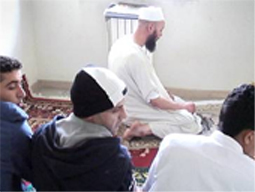Islamic radicalization feared in Europe's jails
 Self-designated imam Arafat Mahmoud, far center, leads an Islamic prayer as Hakimi Abd Elfattah, left, and other prisoners pray in a jail cell in the Bollate prison, on the outskirts of Milan
Self-designated imam Arafat Mahmoud, far center, leads an Islamic prayer as Hakimi Abd Elfattah, left, and other prisoners pray in a jail cell in the Bollate prison, on the outskirts of Milan
By Jennifer Carlile MILAN, Italy —"In prison you only think about waking up, cleaning your cell, and praying," said a Moroccan inmate serving time in a prison on the outskirts of this city. During a recent visit to the Bollate prison, 25-year-old Hakimi Abd Elfattah said he was a non-observant Muslim before being incarcerated, but "there's nothing to do in here, so I learn a little of the Quran
." With no trained imams or Muslim chaplains working in the Bollate prison, the inmate offering guidance on Islam's holy book also is a prisoner. In contrast to the Westernized Elfattah, self-designated imam Arafat Mahmoud sports a skull cap on his shaved head, a thick beard, and refuses to shake hands with women. The 36-year-old said he was not trained at an Islamic college but knew more about Islam than the other prisoners on his floor and had taken it upon himself to instruct inmates from North Africa. Neither inmate would divulge the crimes for which they were incarcerated. Around 30 percent of Bollate's nearly 900 inmates are Muslim, and many of them pray together in various Arabic dialects and other languages four times a day in small, carpeted cells located on each floor and wing of the prison. They pray alone in their cells at night and gather together for large Friday afternoon services. While religion can assist prisoners in bettering their lives, there is a growing fear that radical Islamists are using jails to find recruits, with some analysts saying that al-Qaida is specifically targeting inmates for indoctrination. Alarmed by the possibility, the European Union has made the prevention of recruitment and radicalization in prisons a counter-terrorism priority for the first time. For her part, Bollate prison director Lucia Castellano said she has never suspected any inmates of recruiting for or planning terrorist attacks in her prison. But, she acknowledged that with so many languages spoken within the prison's walls, it would be impossible for guards to know what was being discussed. 'Criminality and Islamism'
"The connection between criminality and Islamism is very tight in Europe," said Michael Radu, a terrorism analyst at the Foreign Policy Research Institute.
"Every (terrorist) attack has converts, and most of them have criminal records and were converted within prisons," he said, noting the cases of British "Shoe Bomber" Richard Reid and José Emilio Suárez Trashorras, the Spaniard who supplied the explosives used in the 2004 Madrid bombings — both of whom converted while incarcerated.
Like the young Moroccan held in the Bollate prison, analysts noted that the majority of Europe's prisoners were not actively engaged in any religion before being locked up, but their confinement often spurs a religious awakening or reawakening.
"In prison individuals are confronted with existential questions in a particularly intensive way" and religion can offer a "possibility to escape prison" at least for one's mind and spirit, said Irene Becci, who has analyzed religion in Italian and German prisons.
There are no statistics on prison conversions, but empirical evidence from British prisons shows that conversion to Islam is probably higher than to Christianity, according to sociology professor Jim Beckford.
"What's more attractive is that it's a relatively straight-forward faith in terms of what's required for someone to declare themselves to be a Muslim; people respond to that promise of an uncomplicated faith that offers security and certainty," said Beckford, who co-authored the book "Muslims In Prison; Challenges and Change in Britain and France." In Florence, Italy, an Arabic cultural mediator said that by introducing Islam into the lives of inmates held at Tuscany's Soliciano prison, he saw a huge change in their personalities. None of the prisoners from Islamic countries prayed when he began visiting them several years ago, but now dozens pray together and those who were using drugs, starving or mutilating themselves have all stopped, according to Mourad Abderrezak.
But, while faith can provide a path to redemption, it can also be misguided. “In prison, a person has the right disposition to reflect on and accept what he’s taught, so you have to be careful of what message is given — either a moderate Islam, or an Islam that let’s say takes another path," Abderrezak said.
It's the other path that worries authorities. "There are very few legitimate imams serving in prisons in places like France, and self-made characters are free to operate – and these are radicals," said Radu, the terrorism analyst.
As the seeker looks for guidance, a "charismatic leader recruits them and when they're out they have a spontaneous (terrorist) cell," he said.
According to Radu, the cycle of "criminality and Islamism" is closed when the radicalized ex-prisoner re-engages in illegal activities to fund al-Qaida attacks. Two of the men involved in Madrid's Atocha bombings fit that mold.
Incarcerated for petty crimes, Trashorras, who was a nominal Christian, and Jamal Ahmidan, a nonobservant Muslim, were both indoctrinated into radical Islam in prison and joined an al-Qaida linked Moroccan group that used drug trafficking to fund terrorist activities before taking lead roles in the deadly train bombings. Due to their nature as “total institutions”, prisons provide a good basis for radicalization and recruitment. The factors favoring radicalization and recruitment in prisons such as boredom, influences from radical preachers, creation of brotherhoods, use and distribution of relevant publications have to be countered effectively.Conclusions from European Union seminar Prison administrations should counteract the conditions favoring radicalization and recruitment in prisons by creating appropriate detention conditions. The exchange of experiences and “best practices” of prison administrations should be encouraged on the national and international level.